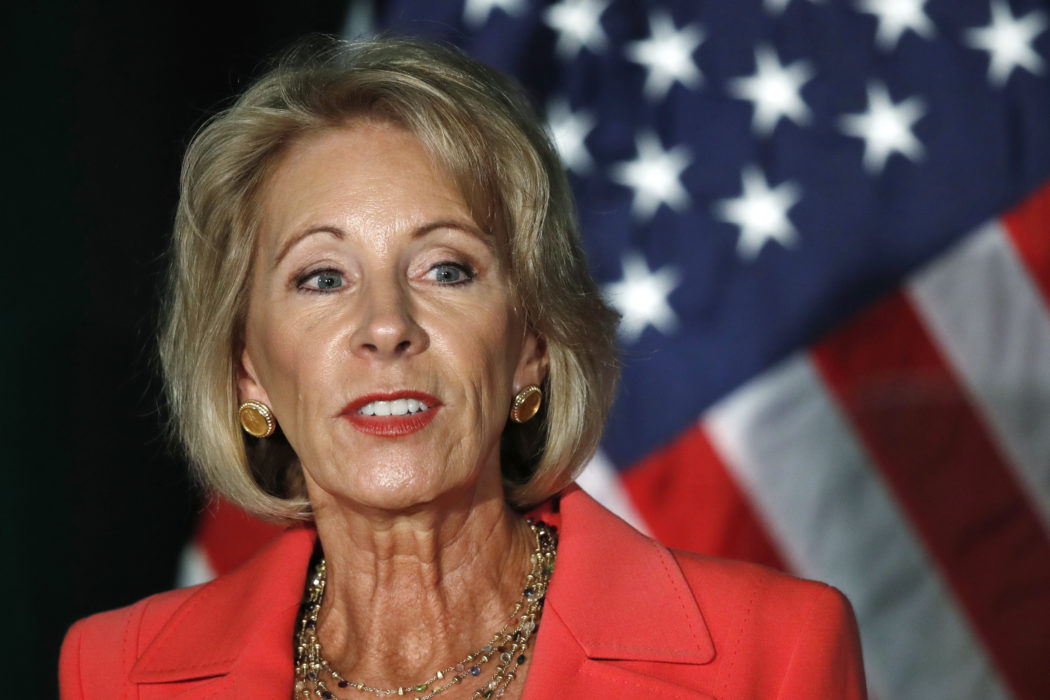Activist outraged as DeVos takes aim at Title IX procedures
United States Secretary of Education Betsy DeVos announced a rollback of Obama-era guidelines on sexual assault, namely the “Dear Colleague” letter, as well as a “Question and Answer on Sexual Assault,” issued in 2011 and 2014 respectively.
The “Dear Colleague” letter was sent to higher education institutions by the previous Department of Education, and encouraged universities to support survivors throughout the process of reporting sexual misconduct. The letter instructed institutions to adapt a “preponderance of evidence” in convictions. After rescinding the directive, DeVos put in place interim rules, encouraging universities to adopt a standard of “clear and convincing evidence”, and to not take disciplinary action until proven.
DeVos cited a “mistreatment” of accused students, as well as a desire to take a closer look at universities’ handling of sexual assault charges.
This move has come under scrutiny by proponents of sexual assault prevention and is widely believed to be a nullification of survivor’s rights, as championed by the Obama administration.
Sen. Patty Murray (D-WA) told The New York Times that the Education Department was “continuing a pattern of undermining survivors’ rights.” Catherine Lhamon, who helped write the aforementioned regulations, said “this backward step invites colleges to once again sweep sexual violence under the rug.”
“This is the Secretary of Education saying that we — falsely — equivalate those who have been the victims of sexual assault with those who are accused of assaulting,” said Turner Bitton, executive director of The Utah Coalition Against Sexual Assault (UCASA). “This sends a very clear signal to survivors that they are not cared about and they are just the same as those who assaulted them.”
Bitton said the false reporting cited in DeVos’ statement is very rare and almost non-existent, because the crime is very serious.
“It is one of the only crimes that goes so often unreported,” Bitton said.
As confirmed by the Utah State Campus Climate Survey, released last week, only 5 percent of USU students formally reported sexual assault, and between 5 and 28 percent of victims nationwide do so. Despite this, Bitton says he is confident USU will continue protecting sexual assault survivors and championing the rights of victims.
“We don’t expect there to be an immediate change on college campuses with their Title IX policies and handling of victims,” Bitton said.
The state of Utah’s rate of rape has been significantly higher than the U.S. rate since 2000, according to the Utah Department of Health. Uniform Crime Reports state Utah’s rate rape has increased 17.5 percent since 2013.
Bitton believes Utah is headed in the right direction with new training to help prevent more sexual assaults for happening. He say the progress the state has made will not be affected by the new policies.
“Utah is very lucky, we are on a very good path,” Bitton said. “Bystander intervention training, as implemented at USU by the (Sexual Assault and Anti-Violence Information Office (SAAVI) SAAVI office, is recognized as a very effective measure in preventing sexual assault. SAAVI has been instrumental in preventing sexual assault, and we’d like to see them as a model to the rest of the state in prevention measures.”
Though groups like and UCASA focus on the experience and recovery of survivors of sexual assault, the Department of Education believes the focus should be equally balanced between the accused and the accuser, according to DeVos.
“The rights of one person can never be paramount to the rights of another,” DeVos said at a speech in Virginia in early September. “The notion that a school must diminish due process rights to better serve the ‘victim‘ only creates more victims.”
Bitton believes, however, that the victim’s rights should be the center of focus in any investigation, and any effort to detract from their rights is devaluing the victim’s tribulation.
“Any time an elected official loses focus that these crimes are extremely serious and detrimental to victims, it sends a very clear signal that the government offices don’t care.”
— carter.moore@aggiemail.usu.edu
@carterthegrreat

